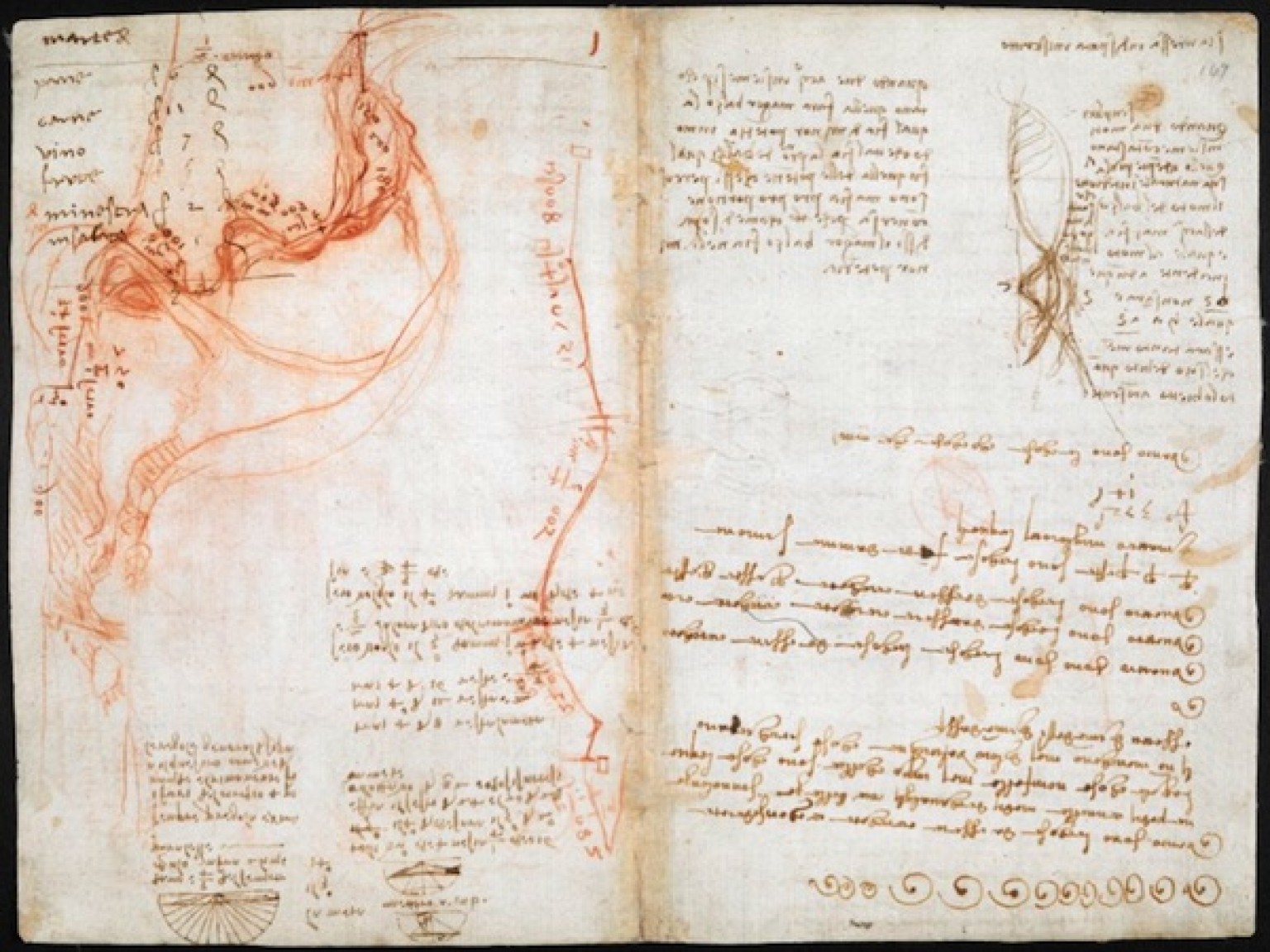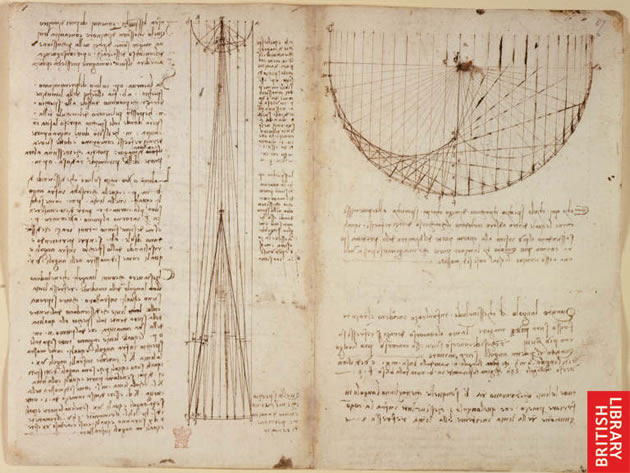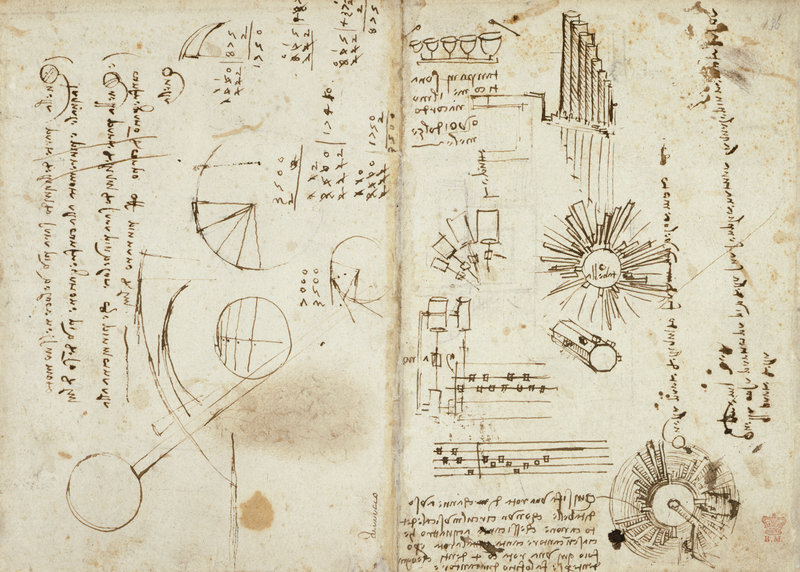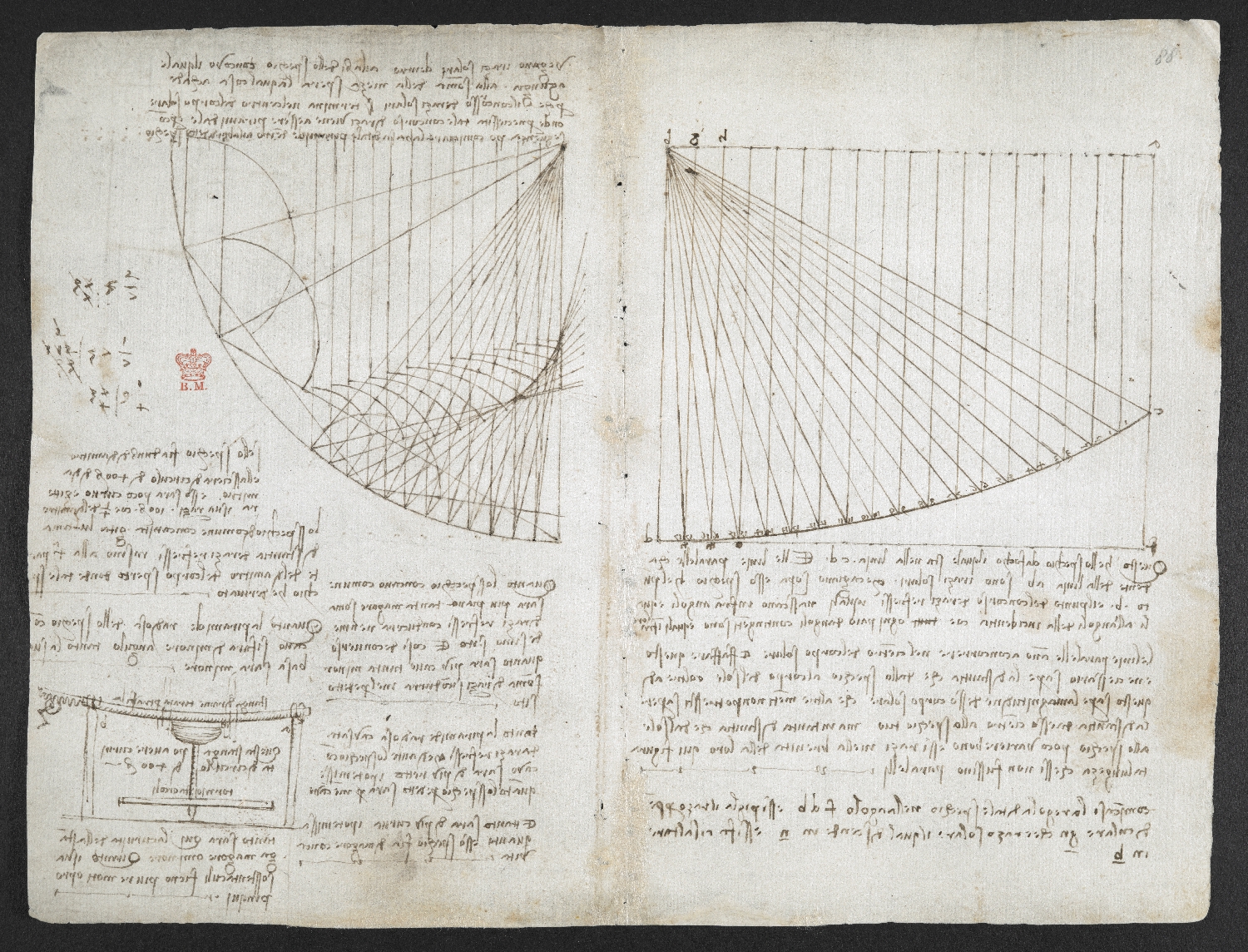
Quick, what do you know about Leonardo da Vinci? He painted the Mona Lisa! He wrote his notes backwards! He designed supercool bridges and flying machines! He was a genius about, um… a lot of other… things… and, um, stuff…
Okay, I’m sure you know a bit more than that, but unless you’re a Renaissance scholar, you’re certain to find yourself amazed and surprised at how much you didn’t know about the quintessential Renaissance man when you encounter a compilation of his notebooks—Codex Arundel—which has been digitized by the British Library and made available to the public.
The notebook, writes Jonathan Jones at The Guardian, represents “the living record of a universal mind.” And yet, though a “technophile” himself, “when it came to publication, Leonardo was a luddite…. He made no effort to get his notes published.”

For hundreds of years, the huge, secretive collection of manuscripts remained mostly unseen by all but the most rarified of collectors. After Leonardo’s death in France, writes the British Library, his student Francesco Melzi “brought many of his manuscripts and drawings back to Italy. Melzi’s heirs, who had no idea of the importance of the manuscripts, gradually disposed of them.” Nonetheless, over 5,000 pages of notes “still exist in Leonardo’s ‘mirror writing’, from right to left.” In the notebooks, da Vinci drew “visions of the aeroplane, the helicopter, the parachute, the submarine and the car. It was more than 300 years before many of his ideas were improved upon.”

The digitized notebooks debuted in 2007 as a joint project of the British Library and Microsoft called “Turning the Pages 2.0,” an interactive feature that allows viewers to “turn” the pages of the notebooks with animations. Onscreen glosses explain the content of the cryptic notes surrounding the many technical drawings, diagrams, and schematics (see a selection of the notebooks in this animated format here). For an overwhelming amount of Leonardo, you can look through 570 digitized pages of Codex Arundel here. For a slightly more digestible, and readable, amount of Leonardo, see the British Library’s brief series on his life and work, including explanations of his diving apparatus, parachute, and glider.

And for much more on the man—including evidence of his sartorial “preference for pink tights” and his shopping lists—see Jonathan Jones’ Guardian piece, which links to other notebook collections and resources. The artist and self-taught polymath made an impressive effort to keep his ideas from prying eyes. Now, thanks to digitized collections like those at the British Library, “anyone can study the mind of Leonardo.”
Related Content:
Leonardo Da Vinci’s To Do List (Circa 1490) Is Much Cooler Than Yours
Josh Jones is a writer and musician based in Durham, NC. Follow him at @jdmagness


The beautiful side of genius.
Thank you for all this!
Leonardo not publishing his notes doesn’t make him a luddite. A luddite is a person who destroys machines because they threaten his job. Secrecy was, in Leonardo’s day, the equivalent to a pattent. It was not his responsibility to share his knowledge, as Johnathan Jones implies. It WAS his responsibility to insure his secrets did not fall into the wrong hands, as they were a matter of national security. Renaissance designers were the engineers who also built the machines of war. He was the equivalent of a DARPA scientist, only hundreds of years beyond his contemporaries.
pink tights are the way to go!
Would be very happy to know more about any other activities you do.
You can find all the 1,119 pages of his greatest work the codex-altanticus at http://www.codex-atlanticus.it
A luddite? Weird characterization of a man who was continually designing new technologies. And what exactly do you think publishing consisted of in DaVinci’s day? How would you suggest he should have “published” his work?
Good news. Thank you for sharing…
Agreed David W
Great too see. We should all have ready access to notebooks and writing not mere typing as it isn’t as effective since our brains wired for tight kinesthetic control of our expressive digits.
Ideas cheap a dime a dozen but, keeping a notebook offers means to review, augment and advance IOW this most important stabilising influence being Feedback.
One wonders if Leonardo fell into patterns of psyche self observation from writing often as much as documenting and keeping track of his fertile mind ?
ie. Could it be his writing was the first form of psyche moderation advice he had mania of genius like bipolar or adherents with the discipline of writing moderating that — like oceans moderate thermal variance of land etc.
Hey, well I’ve flattered myself, I just had a Trump moment !
‘Hey I don’t just have notebooks I have great notebooks but, mine are much better than anyone elses believe me’ ;-)
Seriously we need more feedback, more personal and tangible externalisation of thought process offering us and life in general more variety and management for moving society, environment and our immense unused intellectual capacity forward, cheers
Very well put and you note several aspects of Notebook Work. Keeping Notebooks over decades, leaving space to go back to pages and adding to them, documenting the time, place, context of different entries, taking care to make the pages a work of art as well as the holder of content, using tools and media that engage the hand and mind does bring about an unique meditative state… this is how the me of yesterday can have a dialog with the me of tomorrow and the me of today. This can provide true feedback a critical means to self-coverance.
Did he also write the voynrich manuscripts as a boy..????
You speak with an incisive tongue sir!
All of these comments are quite eloquently written. I will say that a very old and tattered copy of the Notebooks of Leonardo da Vinci was the only book that I read in high school. I thank him for the insight, and I thank “OPEN CULTURE” for this site…
To Mike Massen Thank you for the inspiration about journalling. It had not dawned on me that using technology (typing) in relation to art could restrict the flow of creativity. This is an exciting revelation to me I can’t wait to get started!! :)
I also want to say thank you for injecting your intelligent and delightful humour, sadly a rare commodity, at least in my present world.
They’re upside down LOL
Rick Chase says:
To think, if only a few of the demonstrated actions of Leonardo’s observation were taught to compelling young minds, how much the world would change. The pursuit of knowledge is the only way the human existence will survive.
I was more than privileged as a child to be able to flip through (with a gallery person carefully instructing me) Da Vincis visionary book with the airplane sketches! It was definitely a highlight to my life. The Amsterdam gallery also had piles of Rembrandts very large paintings hanging from what seemed to be clothes lines in a pathway. The paintings were facing one another and we had to tuck our arms in to ensure we were not rubbing up against the paintings. This was over 45 years ago and I can still see these memories in my head! One of the best memories of my life! All people in science and tech need to look at these books!
Thank you for sharing, as I have never known these books where available.
Thank you for sharing such a wonderful piece of work.
He was really genius of j hi is time
I’d like the English Audio edition with diagrams.
Mandy Johnston.… Voynich manuscript to be written by the 16th-century English author Anthony Ascham, whose works include A Little Herbal, published in 1550.
Leornardo was a “Luddite” because he didn’t seek to publish his notes? This is one of the most ignorant statements I’ve ever seen on the subject of the great artist. A man whose interests included drawing, painting, sculpture, architecture, invention, music, mathematics, engineering, literature, anatomy, geology, astronomy, botany, paleontology, and cartography was a Luddite. OK. I’m flabbergasted with the level of flawed analysis by the author of this article. Could anyone be more wrong about anything?
Exactly. Leonardo = DARPA scientist with many talents.
So.. anybody know if Leonardo ever went back to look at his notes? For that matter, how many of the rest of us go back and look at our old working notes?
Thanks for letting us have ability to see all Leonardo was absolutely amazing!!
An absolutely amazing person with unbelievable gifts!